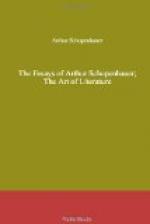Every mediocre writer tries to mask his own natural style, because in his heart he knows the truth of what I am saying. He is thus forced, at the outset, to give up any attempt at being frank or naive—a privilege which is thereby reserved for superior minds, conscious of their own worth, and therefore sure of themselves. What I mean is that these everyday writers are absolutely unable to resolve upon writing just as they think; because they have a notion that, were they to do so, their work might possibly look very childish and simple. For all that, it would not be without its value. If they would only go honestly to work, and say, quite simply, the things they have really thought, and just as they have thought them, these writers would be readable and, within their own proper sphere, even instructive.
But instead of that, they try to make the reader believe that their thoughts have gone much further and deeper than is really the case. They say what they have to say in long sentences that wind about in a forced and unnatural way; they coin new words and write prolix periods which go round and round the thought and wrap it up in a sort of disguise. They tremble between the two separate aims of communicating what they want to say and of concealing it. Their object is to dress it up so that it may look learned or deep, in order to give people the impression that there is very much more in it than for the moment meets the eye. They either jot down their thoughts bit by bit, in short, ambiguous, and paradoxical sentences, which apparently mean much more than they say,—of this kind of writing Schelling’s treatises on natural philosophy are a splendid instance; or else they hold forth with a deluge of words and the most intolerable diffusiveness, as though no end of fuss were necessary to make the reader understand the deep meaning of their sentences, whereas it is some quite simple if not actually trivial idea,—examples of which may be found in plenty in the popular works of Fichte, and the philosophical manuals of a hundred other miserable dunces not worth mentioning; or, again, they try to write in some particular style which they have been pleased to take up and think very grand, a style, for example, par excellence profound and scientific, where the reader is tormented to death by the narcotic effect of longspun periods without a single idea in them,—such as are furnished in a special measure by those most impudent of all mortals, the Hegelians[1]; or it may be that it is an intellectual style they have striven after, where it seems as though their object were to go crazy altogether; and so on in many other cases. All these endeavors to put off the nascetur ridiculus mus—to avoid showing the funny little creature that is born after such mighty throes—often make it difficult to know what it is that they really mean. And then, too, they write down words, nay, even whole sentences, without attaching any meaning to them themselves, but in the hope that someone else will get sense out of them.




